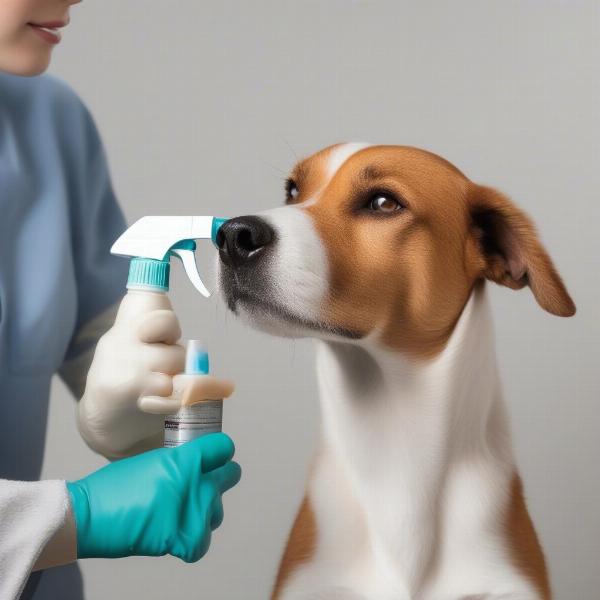Fleas are a common nuisance for dogs, causing itching, irritation, and even more serious health problems. Flea sprays for dogs offer a convenient and effective way to combat these pesky parasites and provide much-needed relief. Choosing the right flea spray, however, can be overwhelming with so many options available. This article will guide you through the process of selecting the best flea spray for your dog, considering factors such as ingredients, effectiveness, and safety.
Understanding Flea Sprays and Their Importance
Fleas are more than just itchy; they can transmit diseases and cause allergic reactions in some dogs. Regular flea control is crucial for maintaining your dog’s health and well-being. Flea sprays offer a direct way to kill fleas on contact and can also provide residual protection, preventing future infestations. Understanding the different types of flea sprays available is the first step towards effective flea control.
Types of Flea Sprays for Dogs
There are various types of flea sprays available, each with its own set of active ingredients and mechanisms of action. Some common types include:
- Synthetic Chemical Sprays: These sprays contain synthetic insecticides that effectively kill fleas. However, some chemicals can be harsh and may not be suitable for all dogs, especially those with sensitive skin.
- Natural Sprays: Natural flea sprays utilize plant-based ingredients like essential oils to repel and kill fleas. These are generally considered safer for dogs and the environment but may not be as potent as synthetic options.
- IGR Sprays (Insect Growth Regulators): IGR sprays target flea larvae and eggs, preventing them from developing into adults. These are often used in conjunction with other flea control methods for comprehensive protection.
Choosing the Right Flea Spray for Your Dog
Selecting the right flea spray requires careful consideration of your dog’s individual needs and circumstances. Here are some key factors to keep in mind:
- Dog’s Age and Size: Puppies and smaller dogs may require specially formulated sprays with lower concentrations of active ingredients.
- Sensitivity and Allergies: If your dog has sensitive skin or a history of allergies, opt for natural sprays or hypoallergenic formulas.
- Severity of Infestation: For heavy infestations, a stronger synthetic spray might be necessary, while a natural spray could suffice for preventative measures.
- Environmental Considerations: Consider the impact of the spray on the environment. Natural sprays are generally more eco-friendly.
How to Apply Flea Spray Safely and Effectively
Proper application is crucial for maximizing the effectiveness and safety of flea sprays. Always follow the manufacturer’s instructions carefully. General guidelines include:
- Protect Yourself: Wear gloves and protective clothing when applying the spray.
- Apply Evenly: Hold the spray bottle a few inches away from your dog’s coat and apply evenly over the entire body, avoiding the eyes, nose, and mouth.
- Massage into Coat: Massage the spray into your dog’s coat to ensure it reaches the skin where fleas hide.
- Allow to Dry: Do not bathe your dog immediately after applying the spray. Allow it to dry completely.
 Applying Flea Spray to a Dog
Applying Flea Spray to a Dog
Combining Flea Sprays with Other Flea Control Methods
Flea sprays can be used alone or in combination with other flea control methods for optimal protection. Other options include:
- Flea Collars: Provide continuous protection against fleas.
- Flea Shampoos: Effective for killing fleas present on the dog at the time of bathing.
- Oral Medications: Systemic treatments that kill fleas through ingestion.
- Topical Treatments: Applied directly to the skin, providing long-lasting protection.
Conclusion
Choosing the right flea spray for your dog is essential for effective flea control and maintaining their health and comfort. organic flea treatment for dogs By considering your dog’s individual needs and understanding the different types of sprays available, you can make an informed decision and provide your furry friend with the best possible protection against these irritating parasites. Don’t hesitate to consult with your veterinarian if you have any concerns or questions about flea control for your dog. Remember, a flea-free dog is a happy dog!
FAQ
- How often should I use flea spray on my dog? Follow the instructions on the product label. Most sprays recommend application every few weeks or as needed.
- Can I use flea spray on puppies? Yes, but choose a puppy-specific formula to avoid any potential harm.
- What should I do if my dog has an allergic reaction to a flea spray? Discontinue use immediately and consult your veterinarian.
- Are natural flea sprays as effective as chemical sprays? Natural sprays can be effective, but they may not be as potent as chemical options, especially for heavy infestations.
- Can I use flea spray on pregnant or lactating dogs? Consult your veterinarian before using any flea control product on pregnant or lactating dogs. anti bite spray for dogs
- What are some signs of a flea infestation? Excessive scratching, biting, hair loss, and flea dirt (small black specks) on the skin.
- Can flea sprays prevent flea-borne diseases? Some sprays can help prevent flea-borne diseases, but it’s essential to consult with your veterinarian for comprehensive prevention strategies. fiprotec for dogs sesame oil in flea spray for dogs yeast spray for dogs
ILM Dog is a leading international dog website dedicated to providing expert advice and resources on all aspects of dog care and wellbeing. From breed selection and health to training and nutrition, we offer valuable information to help you provide the best possible care for your furry companion. We also offer expert guidance on dog grooming and product recommendations. Contact us for more information at [email protected] or +44 20-3965-8624. Visit ILM Dog for more information.